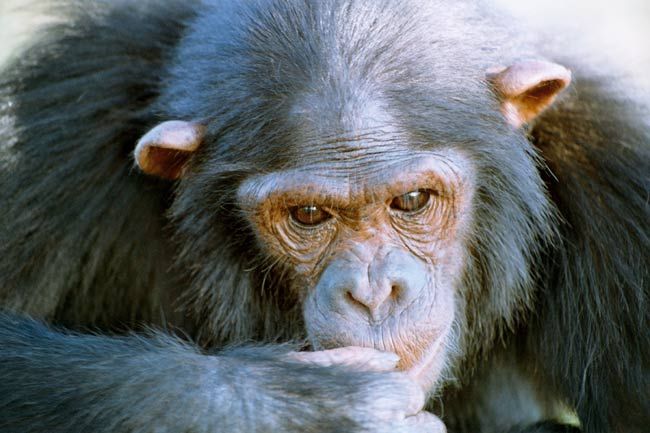Human Nature Rubs Off on Chimps

A bit of human nature can apparently rub off on chimpanzees. Chimps nurtured by humans since birth have a far better chance of figuring out how to use new tools, a new study shows.
The findings highlight untapped potential within chimpanzees that can get uncovered "by studying them when they have been raised under very comparable conditions as our own children," said Ohio State University cognitive primatologist Sally Boysen.
The research suggests that early human ancestors may have been far more sophisticated in their mental capacities than previously thought, she added.
"The emergence of higher order thinking, as well as motor skills that would permit complex tool use and construction and other cultural features of human social interaction, may have been part of our human ancestry much earlier than otherwise predicted by the fossil record of artifacts and human remains," Boysen told LiveScience.
The rake test
Boysen and her colleagues compared three groups of chimps. The first group of nine, dubbed "enculturated," had a long history of socializing with humans. The next group of six dwelt in a chimpanzee sanctuary, with only caretakers as their contact with humans. The last group of seven was raised in more austere lab conditions.
The scientists next showed chimpanzees how they could use small rakes to retrieve a fruit yogurt reward. The rakes either had a rigid plywood head or a flimsy cloth head. The enculturated and sanctuary chimps all correctly picked the rigid rake to help them get the reward, save one enculturated juvenile male, Keeli, who preferred destroying the flimsy rake to getting the reward.
Sign up for the Live Science daily newsletter now
Get the world’s most fascinating discoveries delivered straight to your inbox.
"One of the sanctuary chimps, Rodney, would use the rake to tickle himself after retrieving the food reward—he was pretty funny," Ohio State University comparative psychologist Ellen Furlong recalled.
Lab chimps fail
Boysen and her colleagues then presented the chimpanzees with two identical "hybrid" rakes. The heads of each of these rakes had a side made of plywood and a side made of cloth. The yogurt reward was placed before the rigid side of one rake and in front of the flimsy side of the other rake.
The enculturated chimps successfully chose the hybrid rake that would get them yogurt, as seen in the researchers' video, while the sanctuary apes randomly chose between the tools, findings detailed online in the journal Animal Cognition. This suggests the more chimps had socialized with humans beforehand, the better they were at understanding the actual reason why each tool worked or did not work.
The lab chimpanzees failed both tests given the other chimps. "Since we were able to measure significant differences in nonhumans, imagine the exponential impact on human children under difficult and impoverished conditions in the home that can have long-term effects on their ability to pay attention, remember, learn and process information in general," Boysen said.
Evolutionary psychologist Antoine Spiteri at the University of St. Andrews in Scotland noted further research into how chimps learn from interaction with humans "might provide important insights into the copying mechanisms in apes and humans. It will lead to determining whether the same mechanisms are at play and whether these capacities were shared by an ancestor common to humans and chimpanzees."
'Enculturation' has limits
Boysen and her colleagues suggest chimpanzees nurtured by humans are better at paying attention to the actions of others.
"By the same token, wild chimpanzees have capabilities and skills that have been socially acquired from their mothers or other members of their social groups, such as being able to find all sorts of food types in the environment, and use and modify a wide range of materials as tools for obtaining some foods that are not visually accessible," Boysen said.
"Our enculturated chimpanzees have never had to depend on themselves for food, and thus would be dramatically challenged if they were to be suddenly released into the African forest, completely on their own," she added. "So, the bottom line is that each group of chimps, the wild-born and the enculturated ones, acquired the behaviors and skills of their respective cultures, in a very real sense."
The findings also highlight the need "for a stimulating and enriched environment for captive apes in all settings, including zoos, but more importantly laboratory environments where the negative effects of early rearing, housing and daily care can affect the scientific validity of research, animal health and indeed, quality and length of their lives in captivity," Boysen added.
- Video: Chimp Takes The Rake Test
- Chimps Pass On Culture Like Humans Do
- Video: Jane Goodall's Wild Chimpanzees











